Introduction
The coastal town of Lerici, just south of La Spezia at the southern tip of the Italian Riviera, once again hosted the Underwater Communications and Networking conference (UComms) this year, UComms18, on 28th–30th of August.
UComms18 was the fourth in a series of biennial, international events organised by the NATO STO Centre for Maritime Research and Experimentation (CMRE), this year co-chaired by João Alves & John Potter. The conference aims to bring together key contributors in Under Water (UW) wireless communications and networking to review the state-of-the-art and share understanding of performance constraints and trade-offs with a view to catalysing consensus on standards for interoperability. Key distinguishing features of the conference series include the rigorous review process, designed to accept only the highest-quality innovative papers for presentation in a single-track format, and the high proportion of networking and discussion time allocated. UComms is also known for providing elegant spaces and memorable gastronomy, designed to raise the bar on the quality of the experience and encourage relaxed, meaningful, discussion.
This year, we again staged the conference at the Villa Marigola congress centre, a traditional venue for CMRE conferences and one that continues to delight attendees with its spectacular views and elegant environment, conveniently close to a range of hotels and tourist attractions.
Conference Topics and Format
UW communication capabilities have progressed rapidly in the past decade and are now appreciated as a key enabling technology for maritime autonomous futures, a huge growth area and arguably the hottest topic in maritime science and engineering at the moment. A glance around the exhibitor stands, or paper sessions, at recent OCEANS conferences is enough to demonstrate that autonomous and hybrid vehicles, singly and in teams, are at the core of current disruptive technology developments in ocean engineering.
The progress in UW communications has been achieved both through the development of advanced coherent modulation, demodulation and coding techniques and by moving from point-to-point systems to multi-hop networks. At higher communication stack layers, above the physical layer, there have been significant advances in developing effective Medium Access Control (MAC), routing and other protocols to establish efficient and reliable communications. It has also become clear that the UW bandwidth is, in general, so limited that it is highly unlikely that a ‘one-size-fits-all’ solution can emerge. Systems will need to adaptively reconfigure themselves to the (continuously changing) network topology, environment and application. This is leading the field towards intelligent cognitive approaches with a high degree of cross-layer connectivity, closely integrated with the intelligent adaptive mission capabilities being developed on vehicles.
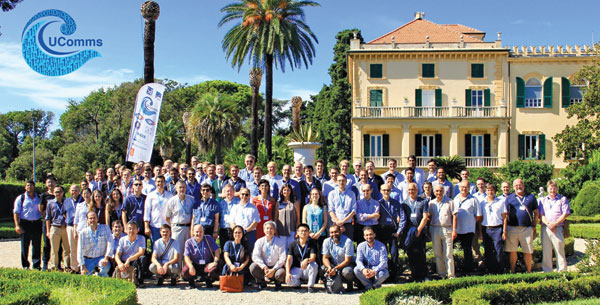 |
| Figure 1. Group photo of UComms18 participants in the gardens of the Villa Marigola congress centre. |
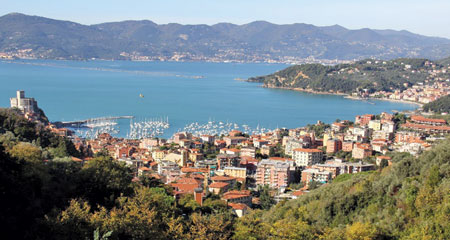 |
Figure 2. A view of the town of Lerici and
the “Golfo dei Poeti”. |
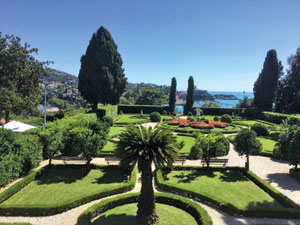 |
Figure 3. The magnificent gardens of the Villa Marigola
congress facility with views over the “Golfo dei Poeti”. |
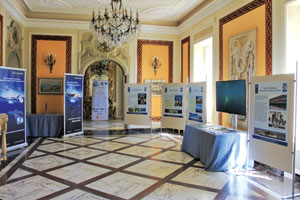 |
| Figure 4. The exhibit area in the Villa Marigola congress centre. |
In stark contrast to the successful model adopted in the Radio Frequency (RF) world for WiFi and cellular telephone networks, the world of UW communications lacks standards on almost every front. Only very recently (March 2017) has the UW communications community seen the acceptance and promulgation of the first standard for digital data exchange, the NATO standard ‘JANUS’, in which UComms played a significant role. The first peer-reviewed draft specification for JANUS was published in the 2014 edition of UComms, following development in close cooperation with the community of interest, in large part represented over the years in the UComms series of conferences since 2012. JANUS is a first step in breaking the interoperability barrier, at the physical level. We hope that UComms continues to engender productive exchanges that will lead to further standards, also in higher levels of the communication stack, and further interoperability gains.
The UComms conferences are organised as a series of structured sessions, coordinated by key researchers in the field who act as session chairs and organisers, attracting top-quality contributions with the intention to generate a vibrant exchange of knowledge and develop a common understanding of the state-of-the-art. The multiple sessions are handled in a single track, giving the opportunity to all participants to follow all the talks and take part in all discussions. This helps break down tendencies to take a ‘stove-piped’ approach to the field and encourages a more holistic appreciation of the challenges, opportunities, solutions and developments.
The session organisers invited contributions from key innovative researchers and, adding in the contributed papers, managed the reviews, ranked and selected the final presentations in coordination with the general chairs and conducted their session at the conference. The session chairs also took in hand the task of engaging the delegates in productive dialogue following each presentation. For each edition of UComms, the focus of the sessions is guided by the nature of the invited and contributed submissions, so that the conference truly reflects the hot-topics of the moment, as perceived by the community, rather than being driven only by the perceptions of the organisers.
For UComms18 a total of nine sessions were convened:
- “Applications and requirements” had the objective to expose a wide range of communication requirements, not all strictly UW, from an end-user point of view to feed back into basic research.
- “Physical Layer in Acoustic Communications” tackled all aspects of the acoustic communications physical layer, from acoustic propagation to channel equalisation and signal modulation.
- “Networking, Localisation and Scheduling” addressed the upper layers of the communications stack as well as network-based services.
- “Simulation, Models and Test Beds” considered the development of models, simulation work and experimental testbeds.
- “Interoperability and Standards” looked at this critical enabler for interoperability, in which underwater communications lags far behind in-air RF communications.
- “Non-Acoustic Communication Modalities” explored the hot topic of optical modalities for UW communications.
- “Communication Architectures and Novel Stacks” gathered contributions on the development of non-traditional communications architectures and protocol stacks that are better tailored to the UW communications environment.
- “Communications in challenging environments” addressed the challenges of communicating in particularly harsh conditions such as under-ice and in the presence of air bubbles.
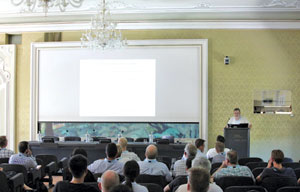 |
Figure 5. Prof. Arthur Baggeroer
delivering his invited talk. |
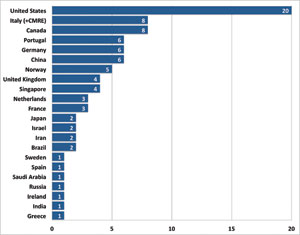 |
Figure 6. Number of papers including at least one
author affiliated with an institution of a given Country. |
Sixty-four manuscripts (ms.) were submitted in response to the call for papers.
Fig. 6 shows the geographic distribution of author affiliations for the submitted ms., illustrating that UComms is indeed a truly international venue, with 30% coming from North America, 40% from Europe and 30% from Asia and elsewhere.
After a very strict review process (where each ms. was independently and blindly reviewed by at least three reviewers), thirty-seven (58%) were selected for presentation and publication in IEEE Xplore. In addition to the regular sessions for presentations, this year we also added two round-table style discussions where the whole floor was invited to participate and contribute.
The conference was opened by the chairs with a very brief introduction, followed by an institutional welcome by CMRE’s Director, Dr. Catherine Warner. We had the pleasure to include two invited talks in the program of the conference. These were delivered by our distinguished guests Prof. Mandar Chitre (NUS Singapore, OES JOE EiC) and Prof. Arthur Baggeroer (MIT).
Prof. Chitre provided the technical “kickoff” for the conference. He delivered a very timely keynote where he shared with the participants his plans as Editor in Chief for the Journal of Oceanic Engineering (JOE) and how they tie in with his vision to facilitate cooperation and to democratize access to the field. He made a compelling proposal that emphasises the publication of reproducible results and the sharing of code and data as an integral part of scientific publication. His ideas open up a new aspect to peer-reviewed science and strongly resonated with the audience. Now that the JOE supports the publication of papers that include code and data sets, we expect to see an increase in such contributions, that without doubt have an enhanced potential to be long-lasting and high-impact.
On Wednesday the 29th, Prof. Baggeroer delivered his invited talk on the topic of directionality for UW communications. With a thought-provoking presentation, he highlighted several advantages that can be derived with directional UW communication systems, such as performance benefits and increased security.
A total of ninety-five delegates participated in UComms18, representing institutions from seventeen different countries. This continues the trend over the years of an increased diversity in the UComms community. The 37 papers presented at UComms18 have already been published online in IEEE Xplore. We invite everyone to browse through them, get updated on the latest in underwater communications and discover a (little) bit of what UComms is all about.
As in previous years, a Special Issue (SI) of the IEEE JOE, with expanded versions of the best papers presented during UComms, is now being prepared and is planned for publication in 2019. All papers presented at UComms are eligible for submission to the SI. The Editorial Board for the SI consists of the UComms18 general chairs João Alves and John Potter, joined by Milica Stojanovic (Northeastern University).
Besides the IEEE OES sponsorship, the 2018 edition of UComms had patron support from the following commercial and non-commercial institutions: NATO Allied Command Transformation (ACT), ONR, ONR-Global, ASA, ATLAS Elektronik, Kongsberg Maritime, and Evologics. These are the organisations and people who enable us to keep the technical quality standard very high, and the registration cost reasonable. Thanks to our sponsors and patrons, UComms does not need to increase acceptance rates from the pressure of financial motivation. This way we can keep UComms single track, high-quality and capable of attracting the best of the field to participate.
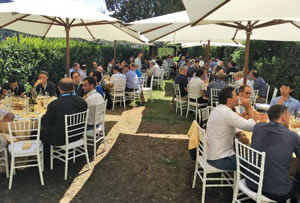 |
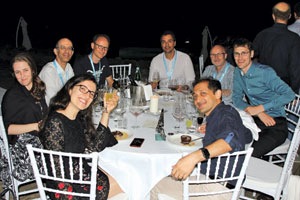 |
| Figure 7. Lunch break in the gardens. |
Figure 8. Time to raise the glass to UComms
during the social dinner. |
Participant Feedback
A key aspect that shapes the evolution of UComms is gathering feedback from participants through an anonymous online survey. This is a practice that was initiated with the first edition in 2012 and which we have continued ever since.
The fifty-one responses collected to date (curiously, the exact same number we collected for UComms16) show us that UComms18 was a resounding success, and specifically that:
- 77% of participants were “extremely satisfied” with the conference while 23% were “Moderately satisfied”. No participant expressed dissatisfaction with the conference.
- 82% found the technical content to be either “extremely strong” or “very strong”.
- 92% found the networking opportunities to be “extremely useful” or “very useful”.
- Concerning format, schedule and periodicity, the vast majority agrees with keeping it a biennial event, single track, with 25 minutes per presentation to accommodate discussions over 3 days, which means maintaining the size at around 42 papers regardless of the number of submissions.
- As per when, in the year, UComms should take place, the last week of August is the period that gathers the most support.
Future UComms Conferences
UComms has been gaining credibility as a top quality international event, bridging Europe and the Americas, since the first edition in 2012, going from strength to strength with every edition. We hope and expect to continue enjoying the support of our sponsors and patrons as we strive to make them proud of our work and achievements, made possible by the enthusiastic engagement and quality contributions of the community. There is an ambition to issue a first call for sponsorship in the spring of 2019 for UComms 2020. The call for papers will be issued in the fall of 2019.
The mission for the fifth UComms will remain one of delivering a top quality conference, where leading scholars of the field want to engage. We plan to explore ways to match this with an increased student and industrial participation. See you in 2020! |







